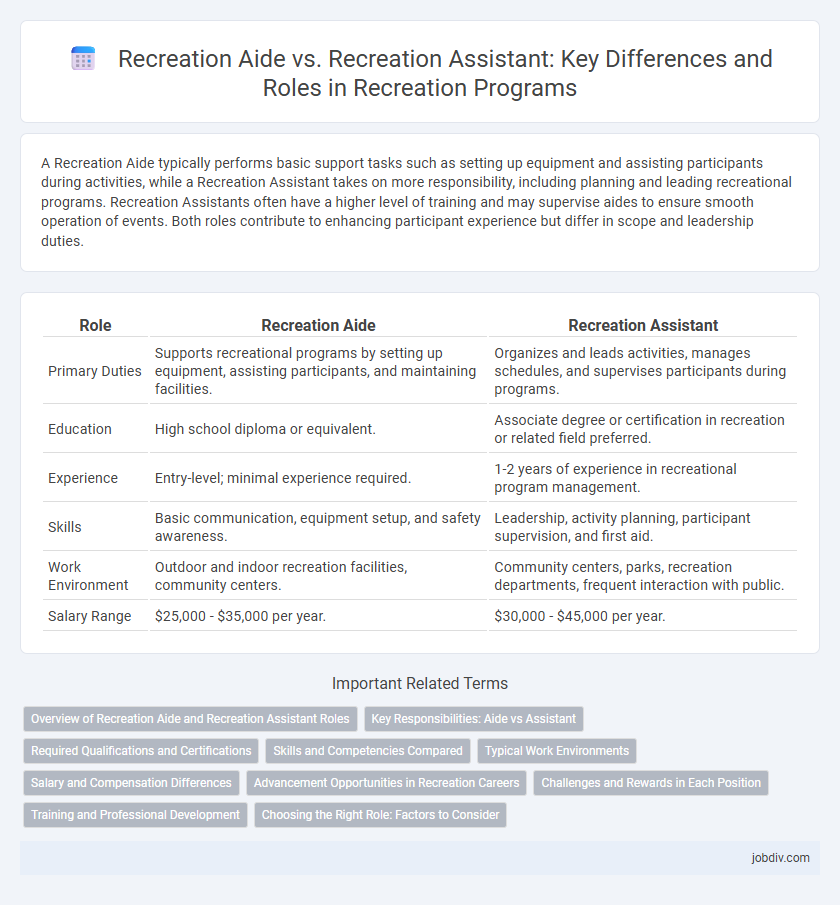A Recreation Aide typically performs basic support tasks such as setting up equipment and assisting participants during activities, while a Recreation Assistant takes on more responsibility, including planning and leading recreational programs. Recreation Assistants often have a higher level of training and may supervise aides to ensure smooth operation of events. Both roles contribute to enhancing participant experience but differ in scope and leadership duties.
Table of Comparison
| Role | Recreation Aide | Recreation Assistant |
|---|---|---|
| Primary Duties | Supports recreational programs by setting up equipment, assisting participants, and maintaining facilities. | Organizes and leads activities, manages schedules, and supervises participants during programs. |
| Education | High school diploma or equivalent. | Associate degree or certification in recreation or related field preferred. |
| Experience | Entry-level; minimal experience required. | 1-2 years of experience in recreational program management. |
| Skills | Basic communication, equipment setup, and safety awareness. | Leadership, activity planning, participant supervision, and first aid. |
| Work Environment | Outdoor and indoor recreation facilities, community centers. | Community centers, parks, recreation departments, frequent interaction with public. |
| Salary Range | $25,000 - $35,000 per year. | $30,000 - $45,000 per year. |
Overview of Recreation Aide and Recreation Assistant Roles
Recreation Aides assist in organizing and supervising recreational activities, focusing on supporting program facilitators and ensuring participant safety during events. Recreation Assistants often have increased responsibilities, including planning activities, managing equipment, and providing direct leadership to participants. Both roles require strong communication and interpersonal skills to enhance participant engagement and deliver effective recreational services.
Key Responsibilities: Aide vs Assistant
Recreation Aides primarily support recreational activities by setting up equipment, assisting participants, and ensuring safety during events, while Recreation Assistants often take on more supervisory roles, organizing schedules, leading activities, and managing program logistics. Aides focus on hands-on support and direct participant interaction, whereas Assistants handle administrative tasks, including documentation and coordination with other staff. Both roles are essential for smooth operation, but Assistants typically carry greater responsibility for planning and program oversight.
Required Qualifications and Certifications
Recreation Aides typically require a high school diploma or equivalent and may need CPR and First Aid certification to support safe activity facilitation. Recreation Assistants often hold additional qualifications such as an associate degree in recreation or related fields, alongside certifications like Certified Therapeutic Recreation Specialist (CTRS) to enhance program delivery. Both roles benefit from strong communication skills and experience in community engagement, but Recreation Assistants usually bear greater responsibility for planning and implementing recreational programs.
Skills and Competencies Compared
Recreation Aides typically possess foundational skills in organizing recreational activities, basic first aid, and strong interpersonal communication to assist participants effectively. Recreation Assistants demonstrate advanced competencies such as program planning, group leadership, and knowledge of adaptive recreation techniques to accommodate diverse populations. Both roles require customer service proficiency and teamwork, but Recreation Assistants often have greater responsibility for implementing and evaluating recreational programs.
Typical Work Environments
Recreation aides commonly work in community centers, parks, and recreational facilities, providing support for organized activities and equipment maintenance. Recreation assistants often find employment in hospitals, senior centers, and rehabilitation facilities, where they facilitate therapeutic recreational programs and assist clients with participation. Both roles typically operate in settings focused on promoting wellness and enhancing community engagement through leisure activities.
Salary and Compensation Differences
Recreation Aides typically earn a lower hourly wage, averaging around $12 to $15, reflecting entry-level responsibilities such as basic activity setup and supervision. Recreation Assistants often receive higher compensation, ranging from $15 to $20 per hour, due to their expanded duties including program planning, participant assessment, and report preparation. Differences in salary correspond to varying levels of experience, certification requirements, and supervisory tasks within community centers, parks, and recreational facilities.
Advancement Opportunities in Recreation Careers
Recreation aides typically start with entry-level duties and limited advancement potential, often requiring additional certifications or education to progress. Recreation assistants usually possess more specialized skills and experience, enabling smoother transitions into roles such as recreation coordinators or program managers. Both positions can lead to career growth, but assistants have clearer pathways to supervisory and leadership roles within recreational services.
Challenges and Rewards in Each Position
Recreation Aides often face challenges such as managing diverse participant needs and ensuring safety during activities, which requires strong interpersonal and problem-solving skills. Recreation Assistants, while encountering similar challenges, typically take on more administrative responsibilities like planning schedules and coordinating events, adding organizational complexities to their role. Both positions offer rewards including the satisfaction of fostering community engagement, promoting physical activity, and contributing to participants' overall well-being and happiness.
Training and Professional Development
Recreation Aides typically receive on-the-job training focused on basic program support and safety procedures, while Recreation Assistants undergo more comprehensive training that includes program planning, leadership skills, and client interaction techniques. Professional development for Recreation Assistants often involves certifications in first aid, CPR, and specialized recreational therapies, enhancing their ability to manage diverse community activities. Continuous skill-building opportunities and workshops are more prevalent for Recreation Assistants, fostering career growth and expertise in recreational management.
Choosing the Right Role: Factors to Consider
Choosing the right role between Recreation Aide and Recreation Assistant depends on factors such as job responsibilities, required qualifications, and career goals. Recreation Aides typically perform entry-level tasks like setting up equipment and assisting participants, while Recreation Assistants often have more specialized duties including program planning and supervision, requiring additional training or certifications. Consider personal skills, preferred level of interaction, and opportunities for advancement when deciding which position aligns best with your interests and long-term objectives.
Recreation Aide vs Recreation Assistant Infographic

 jobdiv.com
jobdiv.com